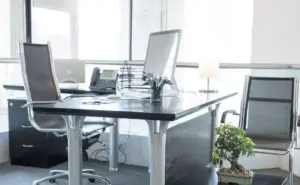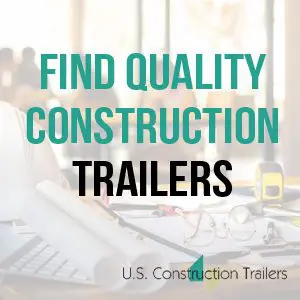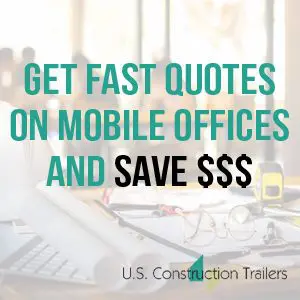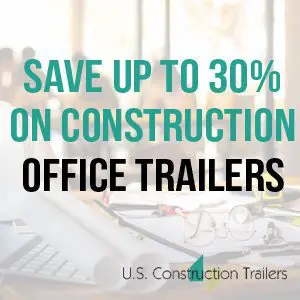
Top 8 Tips for Getting the Best Price on Portable Office Rentals in 2023
As businesses evolve and expand, the need for flexible workspace solutions grows alongside. Portable office rentals have become a sought-after solution for companies needing temporary space. But like any other service, prices can fluctuate based on various factors. To ensure you’re getting the best bang for your buck, consider the following tips for securing the best price on portable office rentals in 2023.
COMPARE QUOTES1. Determine Your Exact Needs:
Before even starting your search, list out your specific requirements. How large does the space need to be? What facilities or features are crucial? Do you need it for a short-term project or a more extended period? Knowing your needs will prevent you from overpaying for features or space you don’t require.
2. Shop Around:
Take the time to contact multiple suppliers. Prices can vary widely between vendors. By gathering several quotes, you can compare and have a clearer idea of the market rate, ensuring you don’t inadvertently pay a premium.
3. Consider the Location:
Just as with real estate, location matters. A portable office in a high-demand area or city center might be more expensive than one located on the outskirts. If you can be flexible with the placement, you might find more competitive rates further from urban hubs.
4. Negotiate:
In many cases, prices aren’t set in stone. After receiving a quote, don’t be shy about negotiating. If you’ve done your research and have prices from competitors, use them as leverage. Remember, vendors would rather rent out their portable office at a slightly lower rate than not rent it out at all.
5. Look for Package Deals:
Some providers offer package deals that include additional services, such as maintenance, utilities, or furniture. These bundled offers can sometimes be more cost-effective than piecing everything together a la carte.

6. Be Flexible with Timing:
Much like hotel rooms, the prices of portable office rentals can fluctuate based on demand. If you can be flexible with your rental start date, try to avoid peak times when demand (and prices) might be higher. For instance, renting during the off-season or mid-month might yield better rates.
7. Check for Hidden Fees:
Always read the rental agreement thoroughly. Some deals might look excellent on the surface, but hidden fees for delivery, setup, maintenance, or early termination can quickly add up. Being aware of the total cost upfront can save you from budgetary surprises down the road.
8. Build a Relationship:
If you foresee a recurring need for portable office spaces, building a relationship with a vendor can be advantageous. Repeat customers often have room to negotiate better rates or get priority during peak demand times.
The demand for flexible, temporary workspace solutions like portable office rentals is on the rise. By being thorough in your research, understanding your needs, and being prepared to negotiate, you can secure the best possible price for your business in 2023. It’s all about strategizing and making informed decisions to ensure you get the right space without stretching your budget.

How Much Can You Expect to Spend on a Portable Office Rental in 2023?
Portable office rentals have garnered significant traction over the years, especially for businesses that prioritize flexibility and on-the-go functionality. As we delve into the costs associated with these mobile workspaces in 2023, several factors influence pricing. Let’s explore some average numbers and variables that can impact your rental expenses.
Average Costs
Based on market research, the average cost of renting a portable office varies depending on its size and features. For a standard, single-unit portable office, businesses might expect to pay anywhere from $200 to $500 per month. If you’re looking at more extensive solutions, like a double-wide unit or a premium unit equipped with advanced features, the price can range between $500 to $1,200 monthly.
Influencing Factors
Several elements play a role in determining the final rental price:
- Duration of Rental: If you’re committing to a more extended rental period, some vendors may offer reduced monthly rates. On the contrary, a short-term rental might come at a slight premium due to the frequent setup and transportation associated with shorter contracts.
- Features and Amenities: Basic portable offices come with essential amenities like electricity and HVAC systems. However, as you add features like plumbing, upgraded interiors, built-in desks, or advanced security systems, the price will correspondingly increase.
- Delivery and Setup Fees: While some vendors include delivery and setup in the rental price, others charge separately for these services. It’s crucial to account for these additional fees, which can range from $100 to $500, depending on the distance and complexity of the setup.
- Location: Renting a portable office in metropolitan areas or regions with high demand will likely be more expensive than in areas with less demand.
- Maintenance and Upkeep: While many rental agreements include basic maintenance, unexpected damages or wear-and-tear repairs might come at an extra cost.

Making an Informed Decision
When budgeting for a portable office rental, it’s essential to consider both the upfront monthly cost and any potential hidden fees. Asking vendors for an all-inclusive quote, or a breakdown of all costs, will ensure there are no surprises. Moreover, keep your business needs at the forefront of your decision. While it’s tempting to opt for the cheapest option, ensure the unit you select aligns with your business’s functional requirements and growth aspirations.
COMPARE QUOTESWhile the costs associated with portable office rentals in 2023 vary widely, a clear understanding of your needs and a thorough review of rental agreements will help you land a deal that offers both value and functionality. Whether you’re a startup finding its feet or an established enterprise requiring temporary space, a portable office can be a cost-effective, flexible solution. Just be sure to navigate the pricing landscape with diligence and foresight.
Beyond the Portable Office: Common Uses for Portable Buildings
While many associate portable buildings primarily with mobile offices, the versatility and adaptability of these structures allow them to serve a myriad of purposes. As businesses and industries evolve, there’s a growing appreciation for solutions that can be easily moved, expanded, or modified based on changing requirements. Let’s explore some of the most popular uses for portable buildings beyond the typical office space.
- Classrooms and Educational Facilities: With schools facing fluctuating enrollments, and sometimes needing temporary space due to renovations or emergencies, portable classrooms have become a go-to solution. These units can provide a conducive learning environment equipped with modern amenities.
- Healthcare Facilities: Portable buildings can be transformed into clinics, laboratories, or even patient wards. Especially during health crises or in regions lacking infrastructure, these structures can offer immediate, efficient medical spaces.
- Construction Site Accommodations: On large construction sites, there’s often a need for temporary housing for workers, storage for equipment, or on-site offices for management. Portable buildings fit this bill perfectly, offering quick set-up and tear-down capabilities.
- Retail Outlets: For businesses that wish to test a new location without committing to permanent infrastructure, portable buildings can serve as temporary shops, stalls, or pop-up stores.
- Event Spaces: From ticket booths to VIP lounges at events or festivals, portable buildings can be customized to serve short-term needs, ensuring organizers aren’t left with unused permanent structures post-event.
- Agricultural Uses: Farmers and agricultural enterprises can utilize portable buildings as temporary storage for crops, a space for equipment, or even as livestock shelters.
- Recreational and Clubhouses: Whether it’s a temporary golf clubhouse or a community center, portable buildings offer flexibility to recreational sites that might see seasonal usage variations.
- Emergency and Disaster Relief: In the aftermath of natural disasters, there’s an immediate need for shelters, medical centers, and coordination hubs. Portable buildings can be rapidly deployed to serve these critical functions.
- Workshops and Studios: Artists, craftsmen, and hobbyists might not always have the space they need at home or might need a separate space that they can relocate as necessary. Portable buildings can become mobile studios or workshops.
- Storage Units: For businesses or individuals requiring temporary storage solutions, portable buildings can be more flexible and convenient than traditional storage facilities.
The adaptability of portable buildings makes them an asset in diverse scenarios. The key lies in recognizing the potential of these structures beyond their conventional uses and leveraging their mobility and flexibility to address unique challenges or opportunities. As you consider a portable building for your needs, think broadly about its potential applications, both immediate and long-term, to maximize your investment’s value.

Factors to Consider When Choosing a Portable Building Provider
Now that we’ve explored the versatile applications of portable buildings, it’s crucial to choose the right provider to ensure you get a unit that meets your specific requirements. Here are some essential points to consider when selecting a portable building supplier:
- Reputation and Experience: Do some research on potential providers. Check for customer reviews and testimonials. How long have they been in the business? A company with a long-standing reputation is likely to provide reliable services.
- Customization Options: Depending on your requirements, you might need customized interiors, specific sizes, or unique features. Ensure that the provider offers a wide range of customization options to cater to your specific needs.
- Delivery and Setup: The convenience of portable buildings lies in their ease of transportation and setup. Confirm whether the provider offers delivery to your location and if they assist with the setup process.
- Quality of Materials: The durability and safety of your portable building are paramount. Ensure that the provider uses high-quality materials that can withstand varying weather conditions and everyday wear and tear.
- Licensing and Certification: Ensure the company adheres to local building codes and industry standards. Their products should be certified for quality and safety.
- Cost and Financing: While looking for competitive prices, be wary of deals that seem too good to be true. A significantly lower price might indicate a compromise in quality. Additionally, some providers might offer financing options, making it easier to manage your budget.
- Flexibility in Contract: If you’re renting the portable building, understand the terms of the contract. Can it be extended? Are there penalties for early termination? A flexible contract can adapt to the changing needs of your business or project.
- After-sales Support: Post-purchase or rental support can be crucial, especially if you encounter any issues or require modifications. A provider that offers robust after-sales service can save you a lot of hassles in the long run.
While portable buildings offer a plethora of benefits and diverse usage scenarios, it’s essential to partner with a provider who understands your needs and can deliver a product that aligns with your objectives. Take the time to evaluate multiple options, ask the right questions, and make an informed decision to make the most of your investment.

Renting vs. Buying Portable Offices: Which is More Cost-Effective?
The decision between renting and buying a portable office often boils down to the specific needs of the business or individual, the duration of use, and budget considerations. Both options have their advantages and potential drawbacks. Let’s delve into the comparative merits of each to help you make a more informed choice.
Renting Portable Offices
Advantages:
- Short-term Solution: If you require a portable office for a limited duration, such as for a construction project, event, or seasonal need, renting can be the ideal choice. You can have the facility you need without the long-term commitment.
- Flexibility: Renting allows for adaptability. If your requirements change, you can easily switch to a larger or smaller unit, or even relocate without much hassle.
- Budget-Friendly: No large initial investment is required. Renting can also be beneficial for cash flow as it’s an operational expense rather than a capital expense.
- Maintenance: Rental agreements often include maintenance, saving you from potential repair costs.
Drawbacks:
- Long-term Expense: If you end up renting for an extended period, the cumulative cost might exceed the price of purchasing.
- Lack of Equity: Unlike buying, you won’t have an asset at the end of your rental period.
Buying Portable Offices
Advantages:
- Long-term Savings: While the initial outlay is more substantial, in the long run, owning can be more cost-effective than continuous rental, especially if you intend to use the office for several years.
- Customization: Ownership allows you the freedom to modify and customize the unit as you see fit, making it perfectly tailored to your needs.
- Asset Value: A well-maintained portable office can have a good resale value. Plus, owning the asset can potentially benefit your business’s balance sheet.
- Fixed Costs: Unlike rental rates that might fluctuate, buying gives you a predictable cost.
Drawbacks:
- Upfront Costs: The initial purchase can be hefty, impacting your liquidity.
- Maintenance Responsibility: All repairs and maintenance will be your responsibility, which can add to the long-term costs if not managed efficiently.
- Less Flexibility: If your business contracts or expands, adjusting might require additional investments.
The decision between renting and buying a portable office largely depends on the specific circumstances and goals of your business. If you need a temporary solution with minimal commitment and flexibility, renting might be your best bet. Conversely, if you’re looking for a long-term solution and wish to build equity in an asset, purchasing could be the more prudent choice. Always consider your business’s financial position, future projections, and the overall costs when making your decision.

Additional Cost Factors to Consider
Beyond the primary considerations of cost, duration, and flexibility, several other factors might influence your decision when it comes to portable office spaces:
Location and Mobility:
If your business operations move from one site to another, like construction or event planning, renting could offer greater mobility. Rental companies typically handle the transportation, setup, and breakdown of the unit, making transitions smoother.
Market Volatility:
In industries where the market can be unpredictable, the flexibility of a rental can be invaluable. Renting doesn’t lock you into owning an asset that may not be needed if business slows.
Tax Implications:
Tax benefits can vary based on whether you’re expensing monthly rental fees or depreciating the asset over time. It’s always a good idea to consult with a tax professional to understand the implications of both scenarios for your business.
Growth Projections:
For businesses on a rapid growth trajectory, buying might seem appealing, as the space can be a long-term asset. However, this can also be a double-edged sword. If you outgrow the space quicker than anticipated, you might find yourself in need of additional facilities, whereas renting might offer more scalability.
Custom Needs:
Certain businesses might have very specific requirements for their portable offices. If these needs are highly specialized and not catered to by standard rental units, buying and customizing might be the way to go.
Environmental Concerns:
Today’s businesses are increasingly environmentally conscious. Some portable office providers focus on eco-friendly units with features like solar panels, efficient insulation, and sustainable materials. Whether you’re renting or buying, it’s worth investigating if you can get a green office space.
Portable offices offer businesses a unique blend of flexibility, cost-efficiency, and functionality. Whether you choose to rent or buy, the most important thing is to ensure that the decision aligns with your business strategy, financial situation, and long-term goals. Do thorough research, consult experts if needed, and make the choice that promises the most value for your business.
COMPARE QUOTES
Leave a Reply